MGBBT1TEN - Sustainable Tourism Development in the UK Environment
VerifiedAdded on 2023/06/08
|10
|2882
|221
Essay
AI Summary
This essay provides a detailed analysis of the tourism environment and industry in the United Kingdom, focusing on sustainable tourism development. It begins by defining sustainable tourism and its principles, emphasizing the importance of mitigating climate impacts, reducing waste, maintaining biodiversity, training staff, consulting stakeholders, and involving local communities. The essay then discusses the crucial role of stakeholders, including government, entrepreneurs, local communities, and NGOs, in decision-making for sustainable tourism. Macro-environmental factors, analyzed through a PESTLE framework, highlight the impact of political, economic, socio-cultural, technological, and environmental elements on UK tourism. The competitive micro-environment is examined using a SWOT analysis, identifying strengths, weaknesses, opportunities, and threats. Porter's Five Forces model is used to assess competitive intensity and profitability. Finally, the essay touches upon tourist motivating factors, referencing Maslow's hierarchy of needs, and underscores the significance of cultural experiences in driving tourism demand. Desklib offers this essay and many other resources to aid students in their studies.
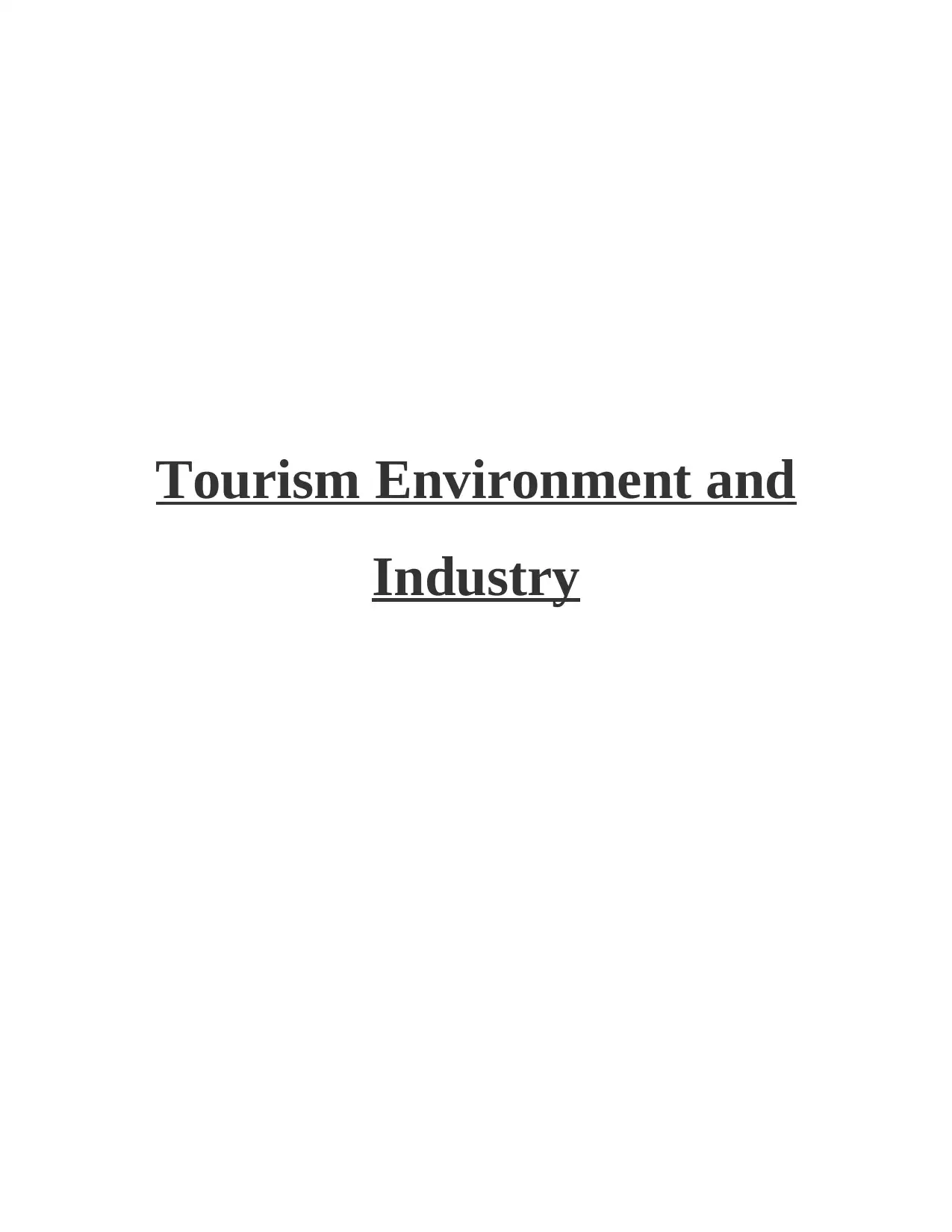
Tourism Environment and
Industry
Industry
Paraphrase This Document
Need a fresh take? Get an instant paraphrase of this document with our AI Paraphraser
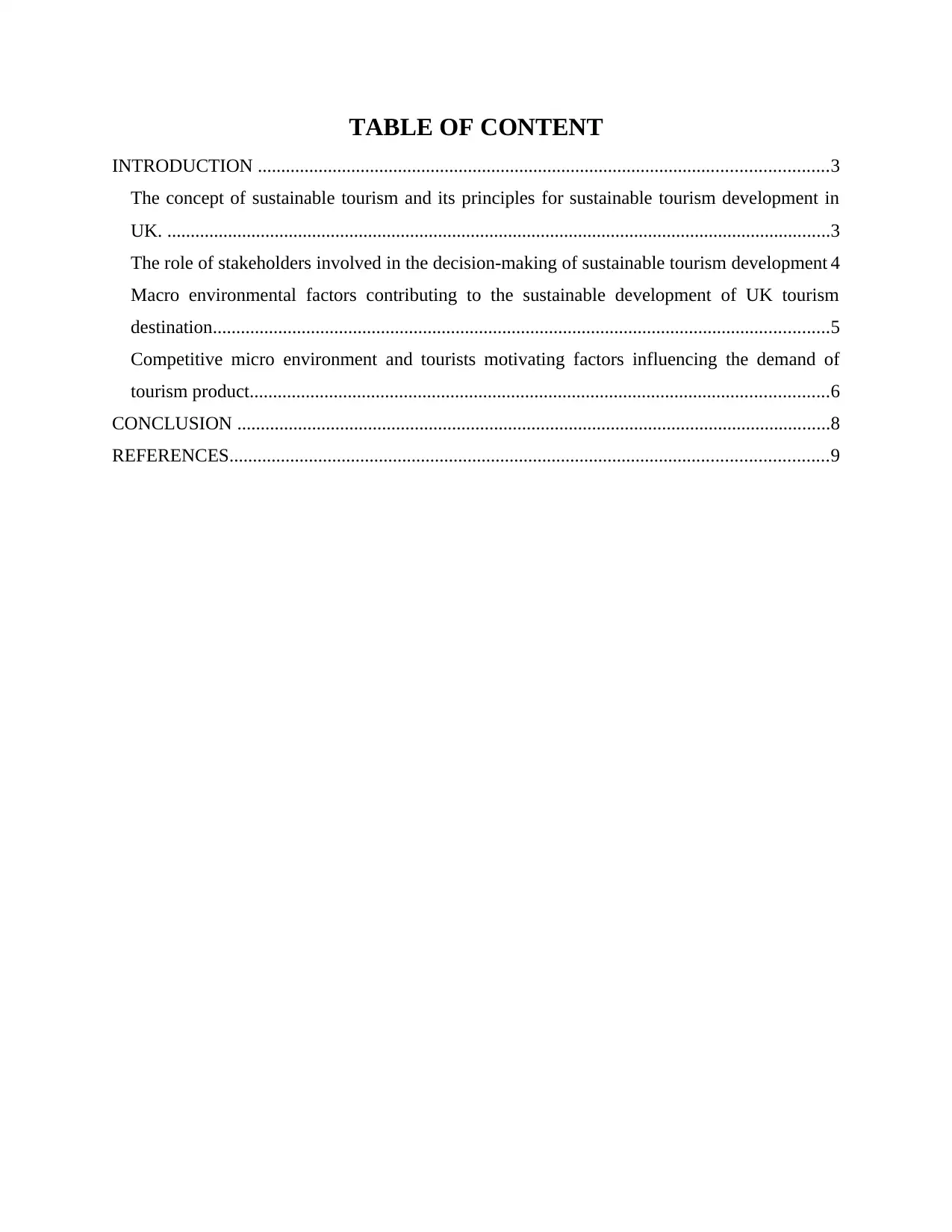
TABLE OF CONTENT
INTRODUCTION ..........................................................................................................................3
The concept of sustainable tourism and its principles for sustainable tourism development in
UK. ..............................................................................................................................................3
The role of stakeholders involved in the decision-making of sustainable tourism development 4
Macro environmental factors contributing to the sustainable development of UK tourism
destination....................................................................................................................................5
Competitive micro environment and tourists motivating factors influencing the demand of
tourism product............................................................................................................................6
CONCLUSION ...............................................................................................................................8
REFERENCES................................................................................................................................9
INTRODUCTION ..........................................................................................................................3
The concept of sustainable tourism and its principles for sustainable tourism development in
UK. ..............................................................................................................................................3
The role of stakeholders involved in the decision-making of sustainable tourism development 4
Macro environmental factors contributing to the sustainable development of UK tourism
destination....................................................................................................................................5
Competitive micro environment and tourists motivating factors influencing the demand of
tourism product............................................................................................................................6
CONCLUSION ...............................................................................................................................8
REFERENCES................................................................................................................................9
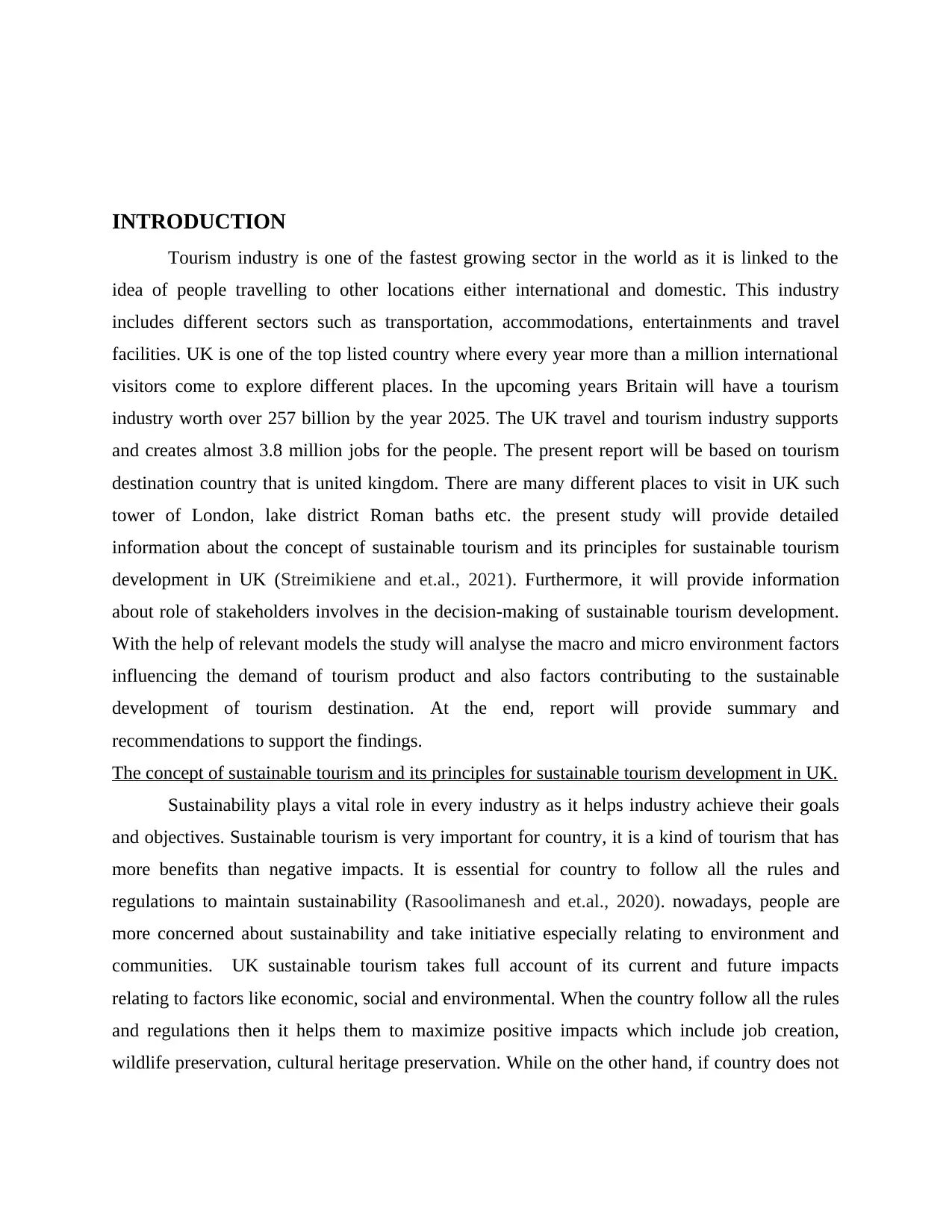
INTRODUCTION
Tourism industry is one of the fastest growing sector in the world as it is linked to the
idea of people travelling to other locations either international and domestic. This industry
includes different sectors such as transportation, accommodations, entertainments and travel
facilities. UK is one of the top listed country where every year more than a million international
visitors come to explore different places. In the upcoming years Britain will have a tourism
industry worth over 257 billion by the year 2025. The UK travel and tourism industry supports
and creates almost 3.8 million jobs for the people. The present report will be based on tourism
destination country that is united kingdom. There are many different places to visit in UK such
tower of London, lake district Roman baths etc. the present study will provide detailed
information about the concept of sustainable tourism and its principles for sustainable tourism
development in UK (Streimikiene and et.al., 2021). Furthermore, it will provide information
about role of stakeholders involves in the decision-making of sustainable tourism development.
With the help of relevant models the study will analyse the macro and micro environment factors
influencing the demand of tourism product and also factors contributing to the sustainable
development of tourism destination. At the end, report will provide summary and
recommendations to support the findings.
The concept of sustainable tourism and its principles for sustainable tourism development in UK.
Sustainability plays a vital role in every industry as it helps industry achieve their goals
and objectives. Sustainable tourism is very important for country, it is a kind of tourism that has
more benefits than negative impacts. It is essential for country to follow all the rules and
regulations to maintain sustainability (Rasoolimanesh and et.al., 2020). nowadays, people are
more concerned about sustainability and take initiative especially relating to environment and
communities. UK sustainable tourism takes full account of its current and future impacts
relating to factors like economic, social and environmental. When the country follow all the rules
and regulations then it helps them to maximize positive impacts which include job creation,
wildlife preservation, cultural heritage preservation. While on the other hand, if country does not
Tourism industry is one of the fastest growing sector in the world as it is linked to the
idea of people travelling to other locations either international and domestic. This industry
includes different sectors such as transportation, accommodations, entertainments and travel
facilities. UK is one of the top listed country where every year more than a million international
visitors come to explore different places. In the upcoming years Britain will have a tourism
industry worth over 257 billion by the year 2025. The UK travel and tourism industry supports
and creates almost 3.8 million jobs for the people. The present report will be based on tourism
destination country that is united kingdom. There are many different places to visit in UK such
tower of London, lake district Roman baths etc. the present study will provide detailed
information about the concept of sustainable tourism and its principles for sustainable tourism
development in UK (Streimikiene and et.al., 2021). Furthermore, it will provide information
about role of stakeholders involves in the decision-making of sustainable tourism development.
With the help of relevant models the study will analyse the macro and micro environment factors
influencing the demand of tourism product and also factors contributing to the sustainable
development of tourism destination. At the end, report will provide summary and
recommendations to support the findings.
The concept of sustainable tourism and its principles for sustainable tourism development in UK.
Sustainability plays a vital role in every industry as it helps industry achieve their goals
and objectives. Sustainable tourism is very important for country, it is a kind of tourism that has
more benefits than negative impacts. It is essential for country to follow all the rules and
regulations to maintain sustainability (Rasoolimanesh and et.al., 2020). nowadays, people are
more concerned about sustainability and take initiative especially relating to environment and
communities. UK sustainable tourism takes full account of its current and future impacts
relating to factors like economic, social and environmental. When the country follow all the rules
and regulations then it helps them to maximize positive impacts which include job creation,
wildlife preservation, cultural heritage preservation. While on the other hand, if country does not
⊘ This is a preview!⊘
Do you want full access?
Subscribe today to unlock all pages.

Trusted by 1+ million students worldwide
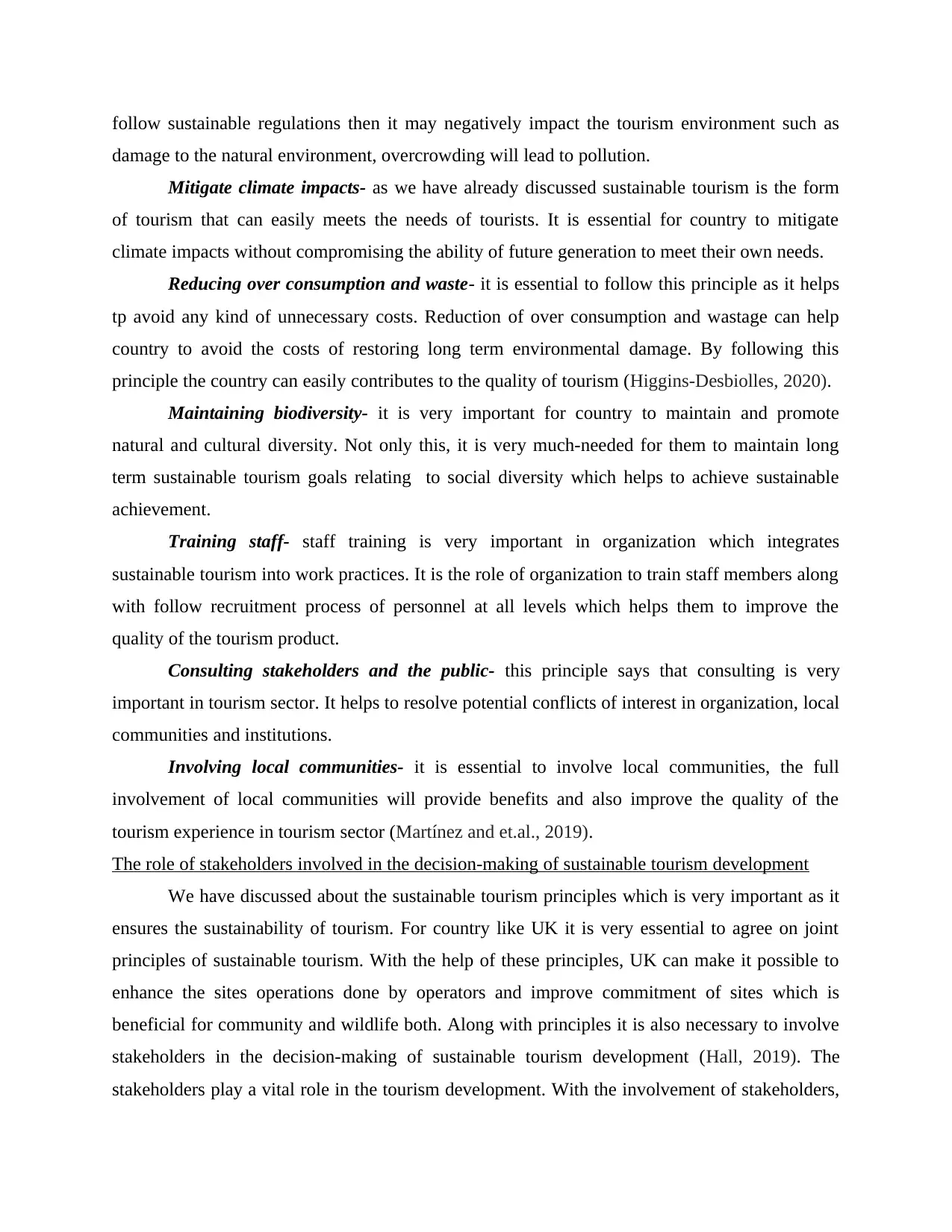
follow sustainable regulations then it may negatively impact the tourism environment such as
damage to the natural environment, overcrowding will lead to pollution.
Mitigate climate impacts- as we have already discussed sustainable tourism is the form
of tourism that can easily meets the needs of tourists. It is essential for country to mitigate
climate impacts without compromising the ability of future generation to meet their own needs.
Reducing over consumption and waste- it is essential to follow this principle as it helps
tp avoid any kind of unnecessary costs. Reduction of over consumption and wastage can help
country to avoid the costs of restoring long term environmental damage. By following this
principle the country can easily contributes to the quality of tourism (Higgins-Desbiolles, 2020).
Maintaining biodiversity- it is very important for country to maintain and promote
natural and cultural diversity. Not only this, it is very much-needed for them to maintain long
term sustainable tourism goals relating to social diversity which helps to achieve sustainable
achievement.
Training staff- staff training is very important in organization which integrates
sustainable tourism into work practices. It is the role of organization to train staff members along
with follow recruitment process of personnel at all levels which helps them to improve the
quality of the tourism product.
Consulting stakeholders and the public- this principle says that consulting is very
important in tourism sector. It helps to resolve potential conflicts of interest in organization, local
communities and institutions.
Involving local communities- it is essential to involve local communities, the full
involvement of local communities will provide benefits and also improve the quality of the
tourism experience in tourism sector (Martínez and et.al., 2019).
The role of stakeholders involved in the decision-making of sustainable tourism development
We have discussed about the sustainable tourism principles which is very important as it
ensures the sustainability of tourism. For country like UK it is very essential to agree on joint
principles of sustainable tourism. With the help of these principles, UK can make it possible to
enhance the sites operations done by operators and improve commitment of sites which is
beneficial for community and wildlife both. Along with principles it is also necessary to involve
stakeholders in the decision-making of sustainable tourism development (Hall, 2019). The
stakeholders play a vital role in the tourism development. With the involvement of stakeholders,
damage to the natural environment, overcrowding will lead to pollution.
Mitigate climate impacts- as we have already discussed sustainable tourism is the form
of tourism that can easily meets the needs of tourists. It is essential for country to mitigate
climate impacts without compromising the ability of future generation to meet their own needs.
Reducing over consumption and waste- it is essential to follow this principle as it helps
tp avoid any kind of unnecessary costs. Reduction of over consumption and wastage can help
country to avoid the costs of restoring long term environmental damage. By following this
principle the country can easily contributes to the quality of tourism (Higgins-Desbiolles, 2020).
Maintaining biodiversity- it is very important for country to maintain and promote
natural and cultural diversity. Not only this, it is very much-needed for them to maintain long
term sustainable tourism goals relating to social diversity which helps to achieve sustainable
achievement.
Training staff- staff training is very important in organization which integrates
sustainable tourism into work practices. It is the role of organization to train staff members along
with follow recruitment process of personnel at all levels which helps them to improve the
quality of the tourism product.
Consulting stakeholders and the public- this principle says that consulting is very
important in tourism sector. It helps to resolve potential conflicts of interest in organization, local
communities and institutions.
Involving local communities- it is essential to involve local communities, the full
involvement of local communities will provide benefits and also improve the quality of the
tourism experience in tourism sector (Martínez and et.al., 2019).
The role of stakeholders involved in the decision-making of sustainable tourism development
We have discussed about the sustainable tourism principles which is very important as it
ensures the sustainability of tourism. For country like UK it is very essential to agree on joint
principles of sustainable tourism. With the help of these principles, UK can make it possible to
enhance the sites operations done by operators and improve commitment of sites which is
beneficial for community and wildlife both. Along with principles it is also necessary to involve
stakeholders in the decision-making of sustainable tourism development (Hall, 2019). The
stakeholders play a vital role in the tourism development. With the involvement of stakeholders,
Paraphrase This Document
Need a fresh take? Get an instant paraphrase of this document with our AI Paraphraser
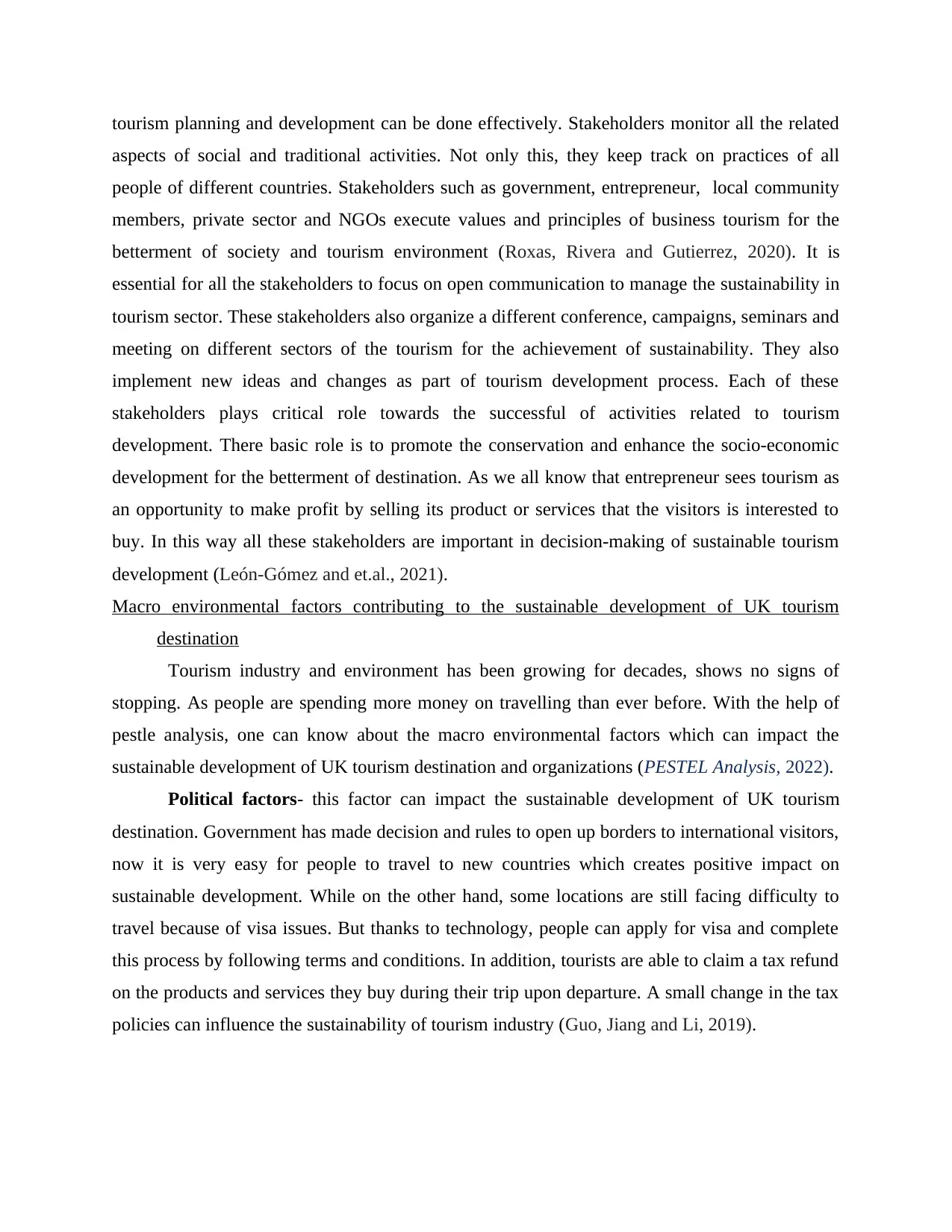
tourism planning and development can be done effectively. Stakeholders monitor all the related
aspects of social and traditional activities. Not only this, they keep track on practices of all
people of different countries. Stakeholders such as government, entrepreneur, local community
members, private sector and NGOs execute values and principles of business tourism for the
betterment of society and tourism environment (Roxas, Rivera and Gutierrez, 2020). It is
essential for all the stakeholders to focus on open communication to manage the sustainability in
tourism sector. These stakeholders also organize a different conference, campaigns, seminars and
meeting on different sectors of the tourism for the achievement of sustainability. They also
implement new ideas and changes as part of tourism development process. Each of these
stakeholders plays critical role towards the successful of activities related to tourism
development. There basic role is to promote the conservation and enhance the socio-economic
development for the betterment of destination. As we all know that entrepreneur sees tourism as
an opportunity to make profit by selling its product or services that the visitors is interested to
buy. In this way all these stakeholders are important in decision-making of sustainable tourism
development (León-Gómez and et.al., 2021).
Macro environmental factors contributing to the sustainable development of UK tourism
destination
Tourism industry and environment has been growing for decades, shows no signs of
stopping. As people are spending more money on travelling than ever before. With the help of
pestle analysis, one can know about the macro environmental factors which can impact the
sustainable development of UK tourism destination and organizations (PESTEL Analysis, 2022).
Political factors- this factor can impact the sustainable development of UK tourism
destination. Government has made decision and rules to open up borders to international visitors,
now it is very easy for people to travel to new countries which creates positive impact on
sustainable development. While on the other hand, some locations are still facing difficulty to
travel because of visa issues. But thanks to technology, people can apply for visa and complete
this process by following terms and conditions. In addition, tourists are able to claim a tax refund
on the products and services they buy during their trip upon departure. A small change in the tax
policies can influence the sustainability of tourism industry (Guo, Jiang and Li, 2019).
aspects of social and traditional activities. Not only this, they keep track on practices of all
people of different countries. Stakeholders such as government, entrepreneur, local community
members, private sector and NGOs execute values and principles of business tourism for the
betterment of society and tourism environment (Roxas, Rivera and Gutierrez, 2020). It is
essential for all the stakeholders to focus on open communication to manage the sustainability in
tourism sector. These stakeholders also organize a different conference, campaigns, seminars and
meeting on different sectors of the tourism for the achievement of sustainability. They also
implement new ideas and changes as part of tourism development process. Each of these
stakeholders plays critical role towards the successful of activities related to tourism
development. There basic role is to promote the conservation and enhance the socio-economic
development for the betterment of destination. As we all know that entrepreneur sees tourism as
an opportunity to make profit by selling its product or services that the visitors is interested to
buy. In this way all these stakeholders are important in decision-making of sustainable tourism
development (León-Gómez and et.al., 2021).
Macro environmental factors contributing to the sustainable development of UK tourism
destination
Tourism industry and environment has been growing for decades, shows no signs of
stopping. As people are spending more money on travelling than ever before. With the help of
pestle analysis, one can know about the macro environmental factors which can impact the
sustainable development of UK tourism destination and organizations (PESTEL Analysis, 2022).
Political factors- this factor can impact the sustainable development of UK tourism
destination. Government has made decision and rules to open up borders to international visitors,
now it is very easy for people to travel to new countries which creates positive impact on
sustainable development. While on the other hand, some locations are still facing difficulty to
travel because of visa issues. But thanks to technology, people can apply for visa and complete
this process by following terms and conditions. In addition, tourists are able to claim a tax refund
on the products and services they buy during their trip upon departure. A small change in the tax
policies can influence the sustainability of tourism industry (Guo, Jiang and Li, 2019).
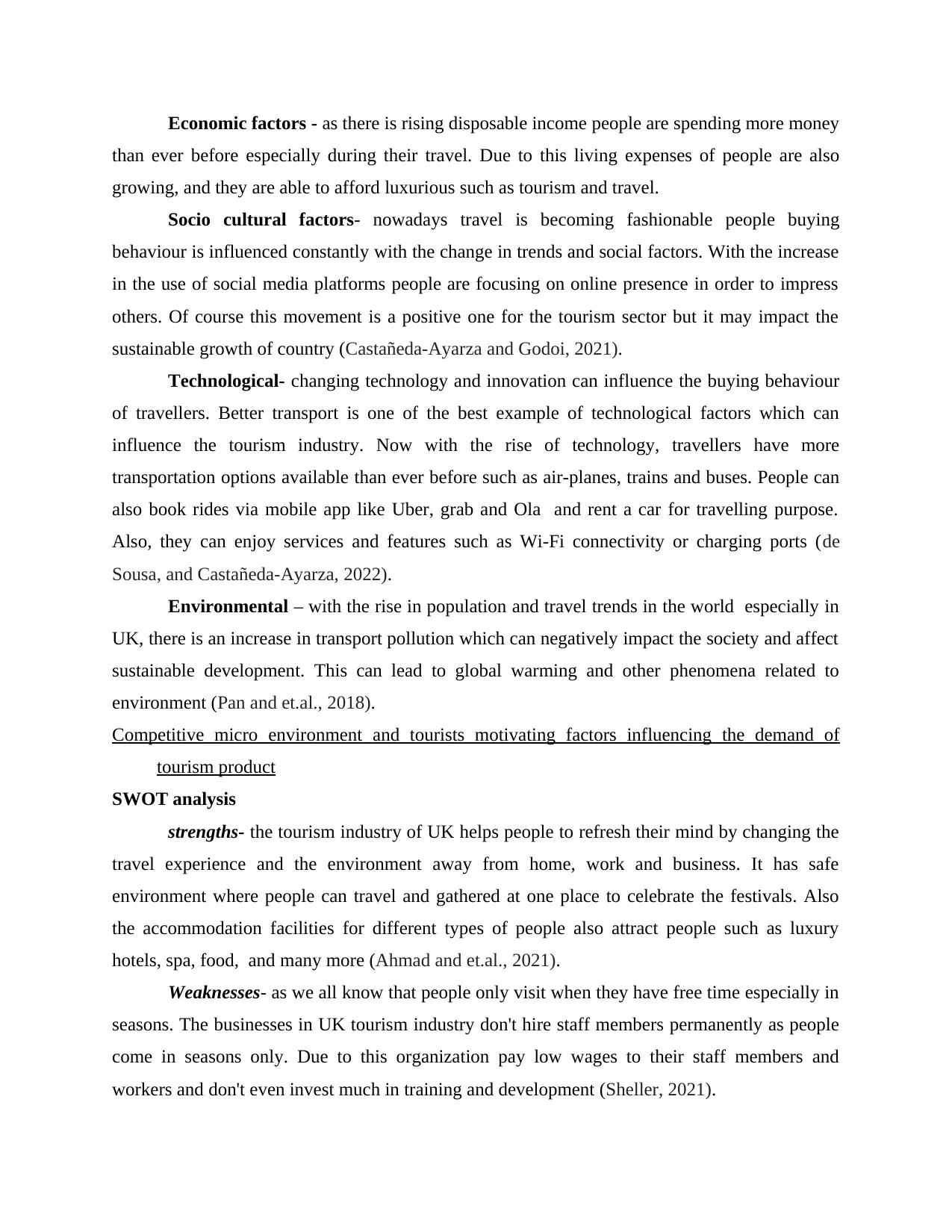
Economic factors - as there is rising disposable income people are spending more money
than ever before especially during their travel. Due to this living expenses of people are also
growing, and they are able to afford luxurious such as tourism and travel.
Socio cultural factors- nowadays travel is becoming fashionable people buying
behaviour is influenced constantly with the change in trends and social factors. With the increase
in the use of social media platforms people are focusing on online presence in order to impress
others. Of course this movement is a positive one for the tourism sector but it may impact the
sustainable growth of country (Castañeda-Ayarza and Godoi, 2021).
Technological- changing technology and innovation can influence the buying behaviour
of travellers. Better transport is one of the best example of technological factors which can
influence the tourism industry. Now with the rise of technology, travellers have more
transportation options available than ever before such as air-planes, trains and buses. People can
also book rides via mobile app like Uber, grab and Ola and rent a car for travelling purpose.
Also, they can enjoy services and features such as Wi-Fi connectivity or charging ports (de
Sousa, and Castañeda-Ayarza, 2022).
Environmental – with the rise in population and travel trends in the world especially in
UK, there is an increase in transport pollution which can negatively impact the society and affect
sustainable development. This can lead to global warming and other phenomena related to
environment (Pan and et.al., 2018).
Competitive micro environment and tourists motivating factors influencing the demand of
tourism product
SWOT analysis
strengths- the tourism industry of UK helps people to refresh their mind by changing the
travel experience and the environment away from home, work and business. It has safe
environment where people can travel and gathered at one place to celebrate the festivals. Also
the accommodation facilities for different types of people also attract people such as luxury
hotels, spa, food, and many more (Ahmad and et.al., 2021).
Weaknesses- as we all know that people only visit when they have free time especially in
seasons. The businesses in UK tourism industry don't hire staff members permanently as people
come in seasons only. Due to this organization pay low wages to their staff members and
workers and don't even invest much in training and development (Sheller, 2021).
than ever before especially during their travel. Due to this living expenses of people are also
growing, and they are able to afford luxurious such as tourism and travel.
Socio cultural factors- nowadays travel is becoming fashionable people buying
behaviour is influenced constantly with the change in trends and social factors. With the increase
in the use of social media platforms people are focusing on online presence in order to impress
others. Of course this movement is a positive one for the tourism sector but it may impact the
sustainable growth of country (Castañeda-Ayarza and Godoi, 2021).
Technological- changing technology and innovation can influence the buying behaviour
of travellers. Better transport is one of the best example of technological factors which can
influence the tourism industry. Now with the rise of technology, travellers have more
transportation options available than ever before such as air-planes, trains and buses. People can
also book rides via mobile app like Uber, grab and Ola and rent a car for travelling purpose.
Also, they can enjoy services and features such as Wi-Fi connectivity or charging ports (de
Sousa, and Castañeda-Ayarza, 2022).
Environmental – with the rise in population and travel trends in the world especially in
UK, there is an increase in transport pollution which can negatively impact the society and affect
sustainable development. This can lead to global warming and other phenomena related to
environment (Pan and et.al., 2018).
Competitive micro environment and tourists motivating factors influencing the demand of
tourism product
SWOT analysis
strengths- the tourism industry of UK helps people to refresh their mind by changing the
travel experience and the environment away from home, work and business. It has safe
environment where people can travel and gathered at one place to celebrate the festivals. Also
the accommodation facilities for different types of people also attract people such as luxury
hotels, spa, food, and many more (Ahmad and et.al., 2021).
Weaknesses- as we all know that people only visit when they have free time especially in
seasons. The businesses in UK tourism industry don't hire staff members permanently as people
come in seasons only. Due to this organization pay low wages to their staff members and
workers and don't even invest much in training and development (Sheller, 2021).
⊘ This is a preview!⊘
Do you want full access?
Subscribe today to unlock all pages.

Trusted by 1+ million students worldwide
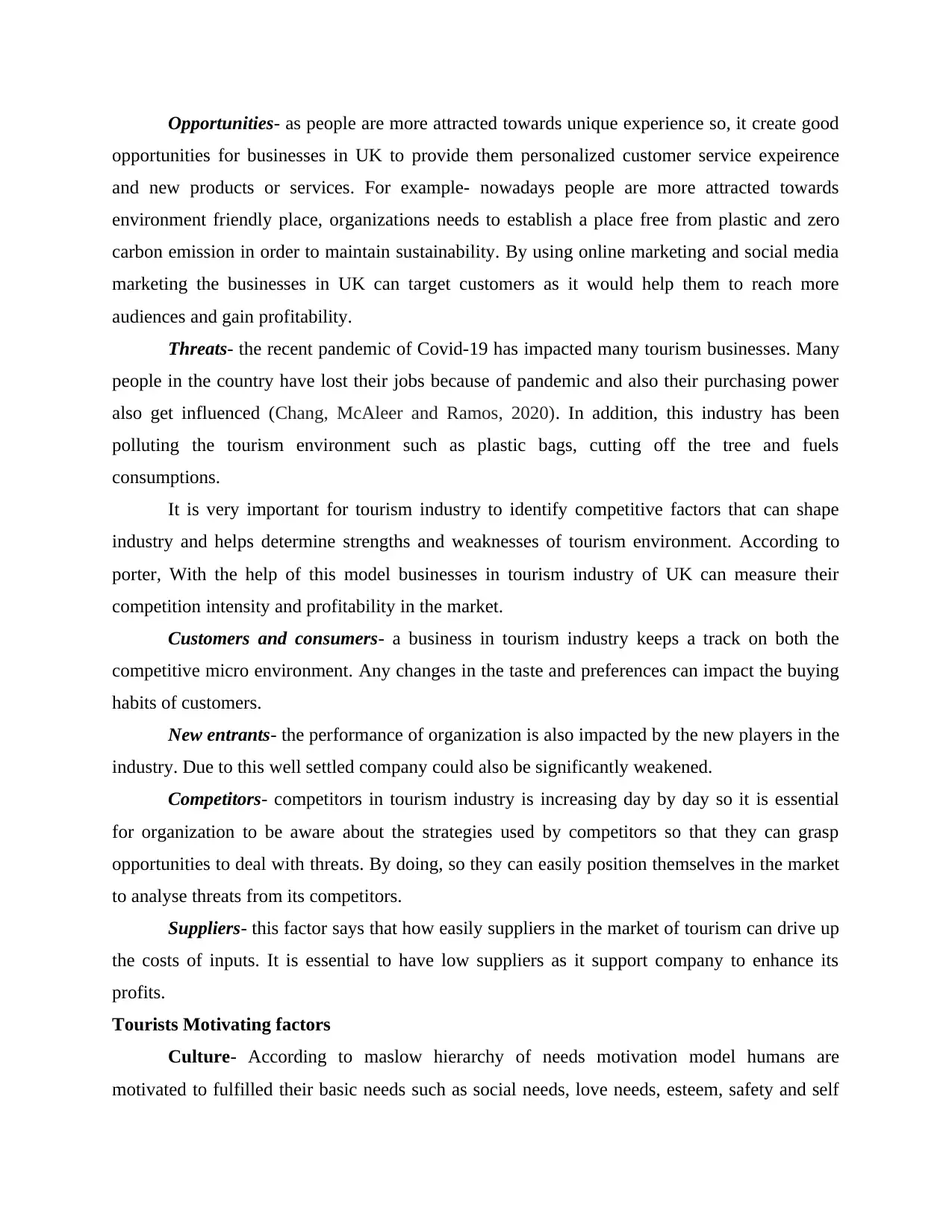
Opportunities- as people are more attracted towards unique experience so, it create good
opportunities for businesses in UK to provide them personalized customer service expeirence
and new products or services. For example- nowadays people are more attracted towards
environment friendly place, organizations needs to establish a place free from plastic and zero
carbon emission in order to maintain sustainability. By using online marketing and social media
marketing the businesses in UK can target customers as it would help them to reach more
audiences and gain profitability.
Threats- the recent pandemic of Covid-19 has impacted many tourism businesses. Many
people in the country have lost their jobs because of pandemic and also their purchasing power
also get influenced (Chang, McAleer and Ramos, 2020). In addition, this industry has been
polluting the tourism environment such as plastic bags, cutting off the tree and fuels
consumptions.
It is very important for tourism industry to identify competitive factors that can shape
industry and helps determine strengths and weaknesses of tourism environment. According to
porter, With the help of this model businesses in tourism industry of UK can measure their
competition intensity and profitability in the market.
Customers and consumers- a business in tourism industry keeps a track on both the
competitive micro environment. Any changes in the taste and preferences can impact the buying
habits of customers.
New entrants- the performance of organization is also impacted by the new players in the
industry. Due to this well settled company could also be significantly weakened.
Competitors- competitors in tourism industry is increasing day by day so it is essential
for organization to be aware about the strategies used by competitors so that they can grasp
opportunities to deal with threats. By doing, so they can easily position themselves in the market
to analyse threats from its competitors.
Suppliers- this factor says that how easily suppliers in the market of tourism can drive up
the costs of inputs. It is essential to have low suppliers as it support company to enhance its
profits.
Tourists Motivating factors
Culture- According to maslow hierarchy of needs motivation model humans are
motivated to fulfilled their basic needs such as social needs, love needs, esteem, safety and self
opportunities for businesses in UK to provide them personalized customer service expeirence
and new products or services. For example- nowadays people are more attracted towards
environment friendly place, organizations needs to establish a place free from plastic and zero
carbon emission in order to maintain sustainability. By using online marketing and social media
marketing the businesses in UK can target customers as it would help them to reach more
audiences and gain profitability.
Threats- the recent pandemic of Covid-19 has impacted many tourism businesses. Many
people in the country have lost their jobs because of pandemic and also their purchasing power
also get influenced (Chang, McAleer and Ramos, 2020). In addition, this industry has been
polluting the tourism environment such as plastic bags, cutting off the tree and fuels
consumptions.
It is very important for tourism industry to identify competitive factors that can shape
industry and helps determine strengths and weaknesses of tourism environment. According to
porter, With the help of this model businesses in tourism industry of UK can measure their
competition intensity and profitability in the market.
Customers and consumers- a business in tourism industry keeps a track on both the
competitive micro environment. Any changes in the taste and preferences can impact the buying
habits of customers.
New entrants- the performance of organization is also impacted by the new players in the
industry. Due to this well settled company could also be significantly weakened.
Competitors- competitors in tourism industry is increasing day by day so it is essential
for organization to be aware about the strategies used by competitors so that they can grasp
opportunities to deal with threats. By doing, so they can easily position themselves in the market
to analyse threats from its competitors.
Suppliers- this factor says that how easily suppliers in the market of tourism can drive up
the costs of inputs. It is essential to have low suppliers as it support company to enhance its
profits.
Tourists Motivating factors
Culture- According to maslow hierarchy of needs motivation model humans are
motivated to fulfilled their basic needs such as social needs, love needs, esteem, safety and self
Paraphrase This Document
Need a fresh take? Get an instant paraphrase of this document with our AI Paraphraser
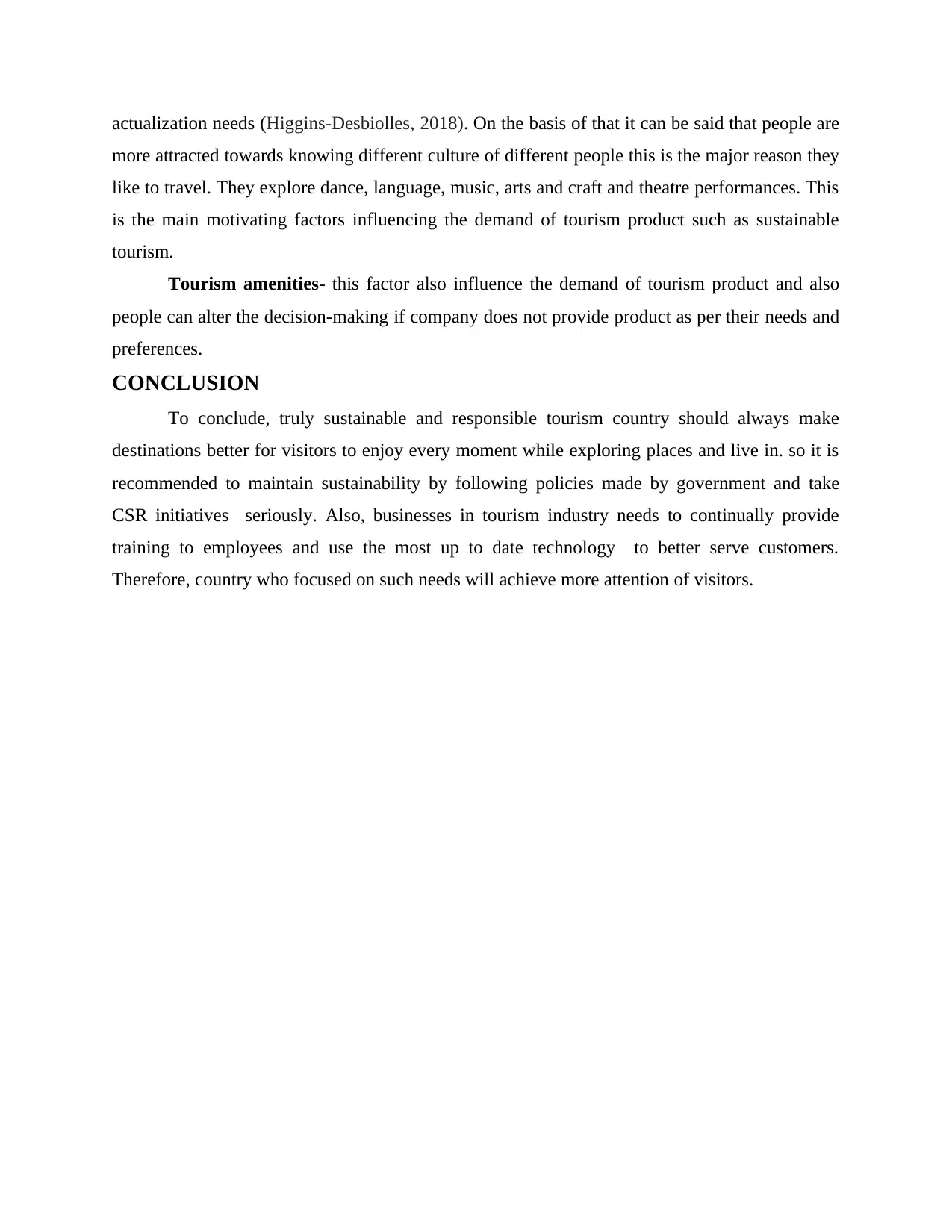
actualization needs (Higgins-Desbiolles, 2018). On the basis of that it can be said that people are
more attracted towards knowing different culture of different people this is the major reason they
like to travel. They explore dance, language, music, arts and craft and theatre performances. This
is the main motivating factors influencing the demand of tourism product such as sustainable
tourism.
Tourism amenities- this factor also influence the demand of tourism product and also
people can alter the decision-making if company does not provide product as per their needs and
preferences.
CONCLUSION
To conclude, truly sustainable and responsible tourism country should always make
destinations better for visitors to enjoy every moment while exploring places and live in. so it is
recommended to maintain sustainability by following policies made by government and take
CSR initiatives seriously. Also, businesses in tourism industry needs to continually provide
training to employees and use the most up to date technology to better serve customers.
Therefore, country who focused on such needs will achieve more attention of visitors.
more attracted towards knowing different culture of different people this is the major reason they
like to travel. They explore dance, language, music, arts and craft and theatre performances. This
is the main motivating factors influencing the demand of tourism product such as sustainable
tourism.
Tourism amenities- this factor also influence the demand of tourism product and also
people can alter the decision-making if company does not provide product as per their needs and
preferences.
CONCLUSION
To conclude, truly sustainable and responsible tourism country should always make
destinations better for visitors to enjoy every moment while exploring places and live in. so it is
recommended to maintain sustainability by following policies made by government and take
CSR initiatives seriously. Also, businesses in tourism industry needs to continually provide
training to employees and use the most up to date technology to better serve customers.
Therefore, country who focused on such needs will achieve more attention of visitors.
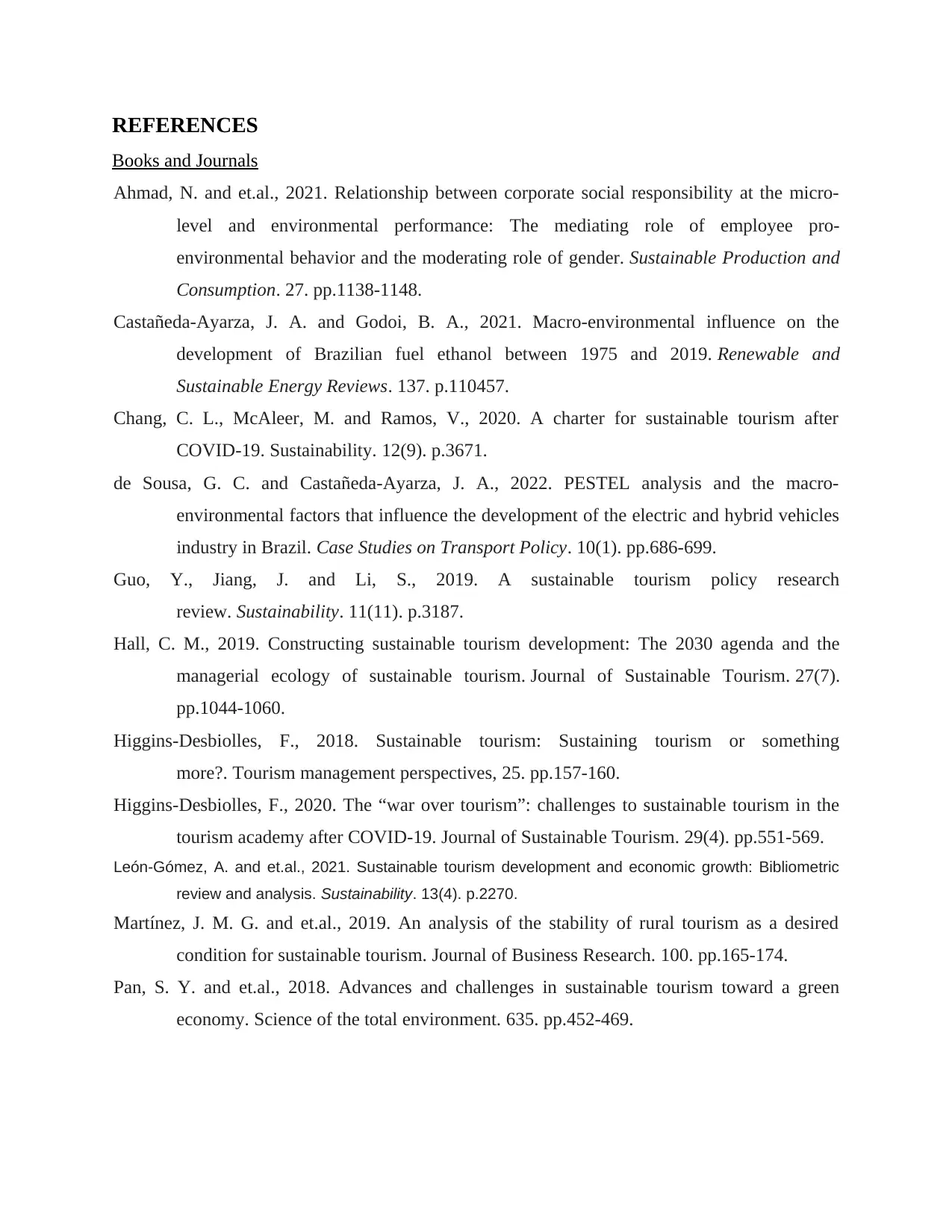
REFERENCES
Books and Journals
Ahmad, N. and et.al., 2021. Relationship between corporate social responsibility at the micro-
level and environmental performance: The mediating role of employee pro-
environmental behavior and the moderating role of gender. Sustainable Production and
Consumption. 27. pp.1138-1148.
Castañeda-Ayarza, J. A. and Godoi, B. A., 2021. Macro-environmental influence on the
development of Brazilian fuel ethanol between 1975 and 2019. Renewable and
Sustainable Energy Reviews. 137. p.110457.
Chang, C. L., McAleer, M. and Ramos, V., 2020. A charter for sustainable tourism after
COVID-19. Sustainability. 12(9). p.3671.
de Sousa, G. C. and Castañeda-Ayarza, J. A., 2022. PESTEL analysis and the macro-
environmental factors that influence the development of the electric and hybrid vehicles
industry in Brazil. Case Studies on Transport Policy. 10(1). pp.686-699.
Guo, Y., Jiang, J. and Li, S., 2019. A sustainable tourism policy research
review. Sustainability. 11(11). p.3187.
Hall, C. M., 2019. Constructing sustainable tourism development: The 2030 agenda and the
managerial ecology of sustainable tourism. Journal of Sustainable Tourism. 27(7).
pp.1044-1060.
Higgins-Desbiolles, F., 2018. Sustainable tourism: Sustaining tourism or something
more?. Tourism management perspectives, 25. pp.157-160.
Higgins-Desbiolles, F., 2020. The “war over tourism”: challenges to sustainable tourism in the
tourism academy after COVID-19. Journal of Sustainable Tourism. 29(4). pp.551-569.
León-Gómez, A. and et.al., 2021. Sustainable tourism development and economic growth: Bibliometric
review and analysis. Sustainability. 13(4). p.2270.
Martínez, J. M. G. and et.al., 2019. An analysis of the stability of rural tourism as a desired
condition for sustainable tourism. Journal of Business Research. 100. pp.165-174.
Pan, S. Y. and et.al., 2018. Advances and challenges in sustainable tourism toward a green
economy. Science of the total environment. 635. pp.452-469.
Books and Journals
Ahmad, N. and et.al., 2021. Relationship between corporate social responsibility at the micro-
level and environmental performance: The mediating role of employee pro-
environmental behavior and the moderating role of gender. Sustainable Production and
Consumption. 27. pp.1138-1148.
Castañeda-Ayarza, J. A. and Godoi, B. A., 2021. Macro-environmental influence on the
development of Brazilian fuel ethanol between 1975 and 2019. Renewable and
Sustainable Energy Reviews. 137. p.110457.
Chang, C. L., McAleer, M. and Ramos, V., 2020. A charter for sustainable tourism after
COVID-19. Sustainability. 12(9). p.3671.
de Sousa, G. C. and Castañeda-Ayarza, J. A., 2022. PESTEL analysis and the macro-
environmental factors that influence the development of the electric and hybrid vehicles
industry in Brazil. Case Studies on Transport Policy. 10(1). pp.686-699.
Guo, Y., Jiang, J. and Li, S., 2019. A sustainable tourism policy research
review. Sustainability. 11(11). p.3187.
Hall, C. M., 2019. Constructing sustainable tourism development: The 2030 agenda and the
managerial ecology of sustainable tourism. Journal of Sustainable Tourism. 27(7).
pp.1044-1060.
Higgins-Desbiolles, F., 2018. Sustainable tourism: Sustaining tourism or something
more?. Tourism management perspectives, 25. pp.157-160.
Higgins-Desbiolles, F., 2020. The “war over tourism”: challenges to sustainable tourism in the
tourism academy after COVID-19. Journal of Sustainable Tourism. 29(4). pp.551-569.
León-Gómez, A. and et.al., 2021. Sustainable tourism development and economic growth: Bibliometric
review and analysis. Sustainability. 13(4). p.2270.
Martínez, J. M. G. and et.al., 2019. An analysis of the stability of rural tourism as a desired
condition for sustainable tourism. Journal of Business Research. 100. pp.165-174.
Pan, S. Y. and et.al., 2018. Advances and challenges in sustainable tourism toward a green
economy. Science of the total environment. 635. pp.452-469.
⊘ This is a preview!⊘
Do you want full access?
Subscribe today to unlock all pages.

Trusted by 1+ million students worldwide
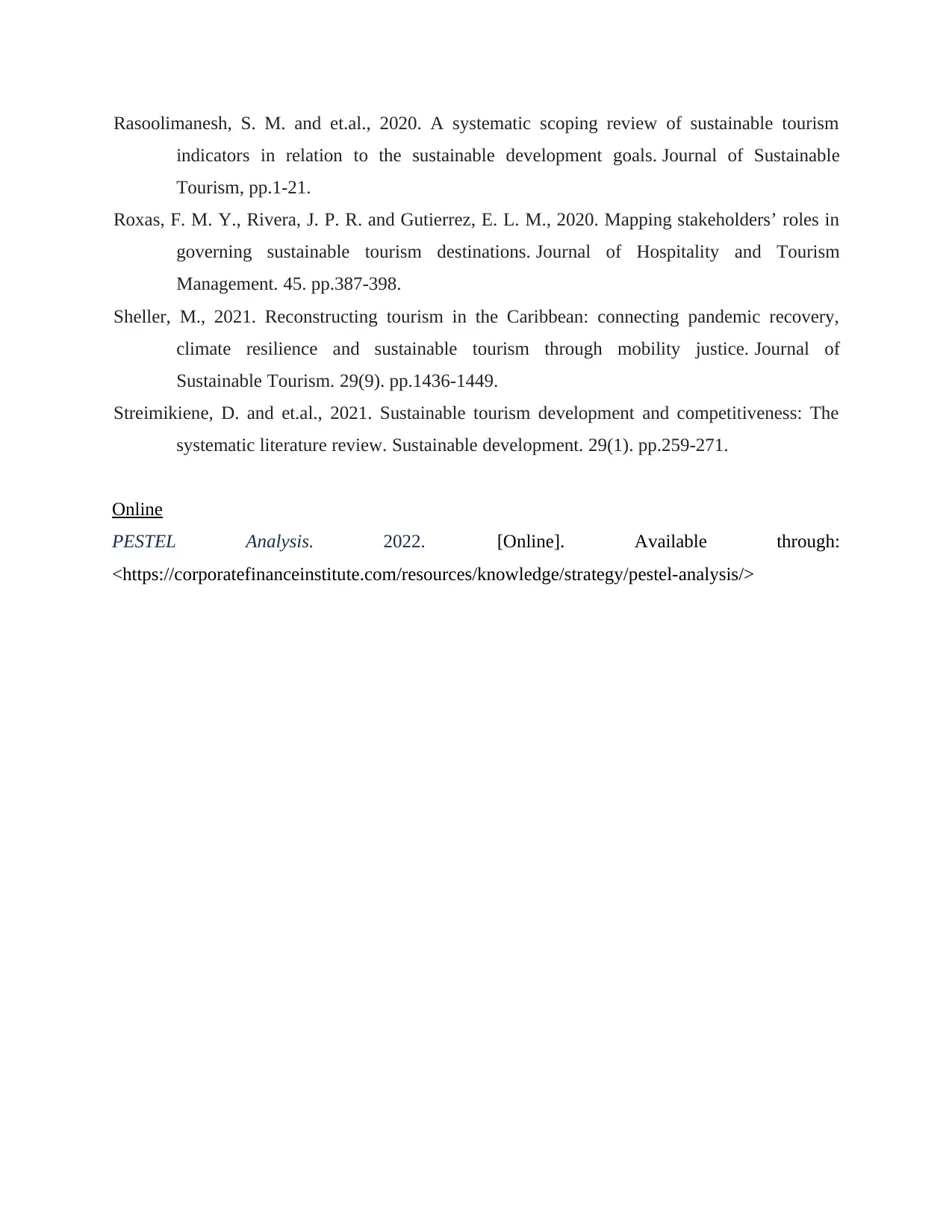
Rasoolimanesh, S. M. and et.al., 2020. A systematic scoping review of sustainable tourism
indicators in relation to the sustainable development goals. Journal of Sustainable
Tourism, pp.1-21.
Roxas, F. M. Y., Rivera, J. P. R. and Gutierrez, E. L. M., 2020. Mapping stakeholders’ roles in
governing sustainable tourism destinations. Journal of Hospitality and Tourism
Management. 45. pp.387-398.
Sheller, M., 2021. Reconstructing tourism in the Caribbean: connecting pandemic recovery,
climate resilience and sustainable tourism through mobility justice. Journal of
Sustainable Tourism. 29(9). pp.1436-1449.
Streimikiene, D. and et.al., 2021. Sustainable tourism development and competitiveness: The
systematic literature review. Sustainable development. 29(1). pp.259-271.
Online
PESTEL Analysis. 2022. [Online]. Available through:
<https://corporatefinanceinstitute.com/resources/knowledge/strategy/pestel-analysis/>
indicators in relation to the sustainable development goals. Journal of Sustainable
Tourism, pp.1-21.
Roxas, F. M. Y., Rivera, J. P. R. and Gutierrez, E. L. M., 2020. Mapping stakeholders’ roles in
governing sustainable tourism destinations. Journal of Hospitality and Tourism
Management. 45. pp.387-398.
Sheller, M., 2021. Reconstructing tourism in the Caribbean: connecting pandemic recovery,
climate resilience and sustainable tourism through mobility justice. Journal of
Sustainable Tourism. 29(9). pp.1436-1449.
Streimikiene, D. and et.al., 2021. Sustainable tourism development and competitiveness: The
systematic literature review. Sustainable development. 29(1). pp.259-271.
Online
PESTEL Analysis. 2022. [Online]. Available through:
<https://corporatefinanceinstitute.com/resources/knowledge/strategy/pestel-analysis/>
1 out of 10
Related Documents
Your All-in-One AI-Powered Toolkit for Academic Success.
+13062052269
info@desklib.com
Available 24*7 on WhatsApp / Email
![[object Object]](/_next/static/media/star-bottom.7253800d.svg)
Unlock your academic potential
Copyright © 2020–2026 A2Z Services. All Rights Reserved. Developed and managed by ZUCOL.

